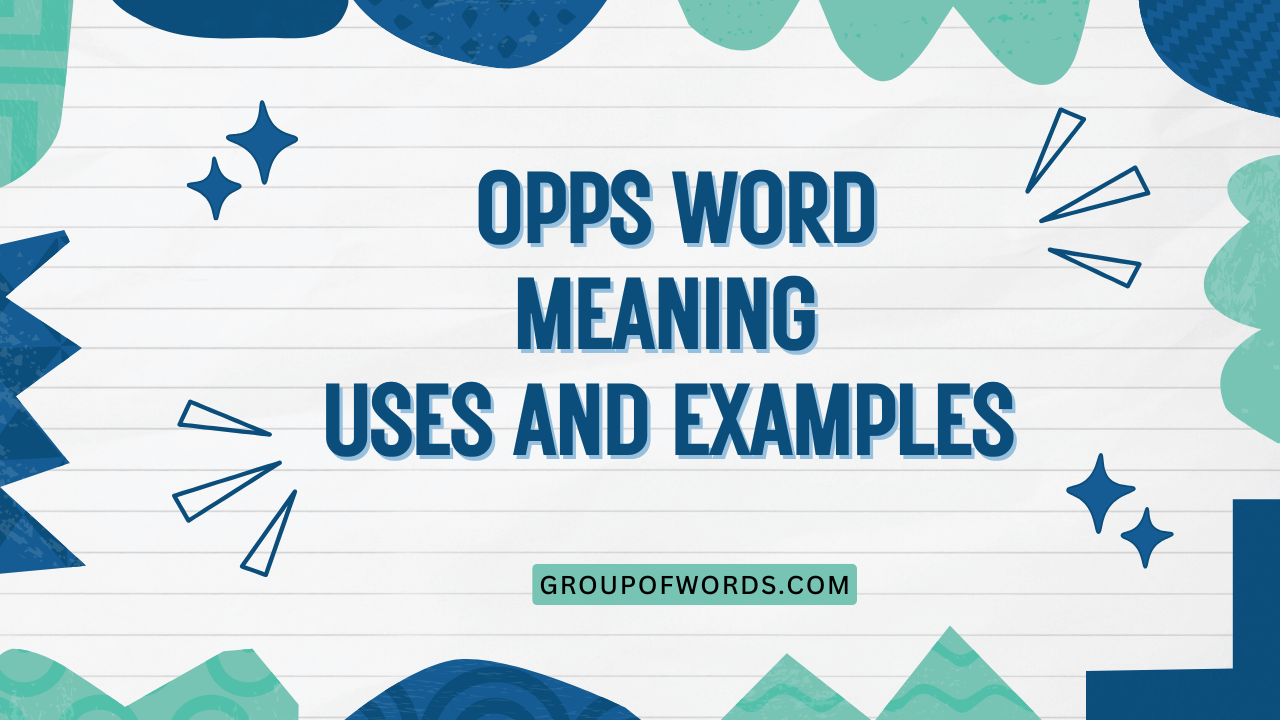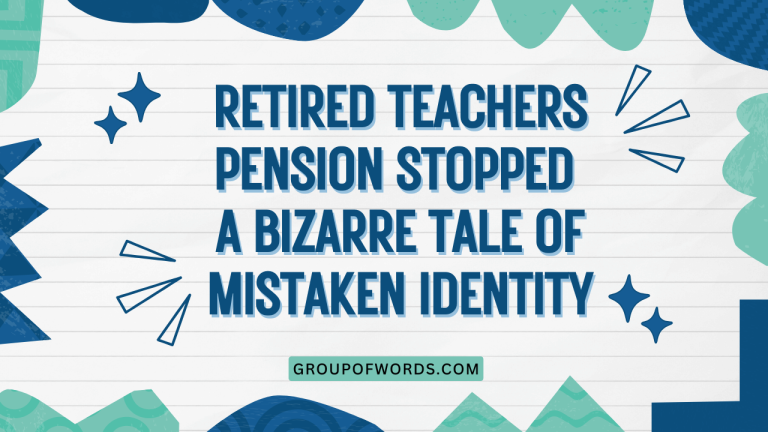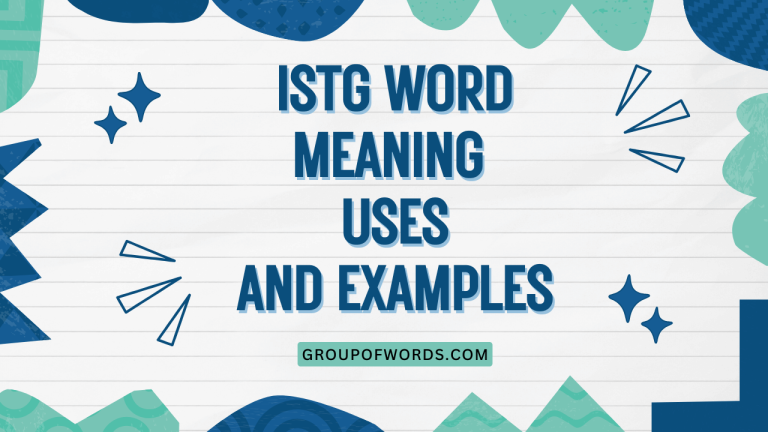“Oops”: Meaning, Usage, and Grammar in Everyday English
The interjection “oops” is a ubiquitous part of everyday English, used to acknowledge minor mistakes or accidents. While seemingly simple, understanding its nuances and appropriate usage is crucial for effective communication.
This article provides a comprehensive guide to “oops,” exploring its definition, structure, variations, and proper application. Whether you’re a native speaker looking to refine your understanding or an English language learner aiming for fluency, this guide will equip you with the knowledge to use “oops” confidently and correctly.
This article is designed for anyone who wants to improve their understanding of common English interjections and how they are used in everyday conversation. From students learning English as a second language to native speakers seeking a better grasp of informal language, this guide offers valuable insights and practical examples.
Table of Contents
- Definition of “Oops”
- Structural Breakdown
- Variations and Categories of “Oops”
- Examples of “Oops” in Various Contexts
- Usage Rules for “Oops”
- Common Mistakes When Using “Oops”
- Practice Exercises
- Advanced Topics: Nuances and Subtleties
- Frequently Asked Questions (FAQ)
- Conclusion
Definition of “Oops”
“Oops” is an interjection used to express mild apology, acknowledgment of a small mistake, or a minor accident. It is generally considered informal and is used in casual conversation rather than formal writing or speech.
The word itself is thought to be onomatopoeic, mimicking the sound someone might make when they stumble or commit a small error. Its primary function is to signal to others that you are aware of the mistake and, often, that you regret it (to a small degree).
In linguistic terms, “oops” functions as an interjection, which is a word or phrase used to express a sudden feeling or emotion. Interjections stand alone and are not grammatically related to other parts of the sentence. While not essential for the grammatical structure of a sentence, interjections add color and personality to speech, making it more expressive and relatable.
The context in which “oops” is used significantly impacts its interpretation. It can convey a range of emotions from amusement to slight embarrassment, depending on the situation and the speaker’s tone.
Generally, it is used for errors that are not serious or consequential.
Structural Breakdown
Structurally, “oops” is a simple, one-syllable word. Its simplicity contributes to its ease of use and widespread adoption.
It doesn’t have complex grammatical features, such as verb conjugations or plural forms, as it functions solely as an interjection. The pronunciation is straightforward, typically with a short “u” sound and a voiceless “ps” ending.
While “oops” itself doesn’t change, the way it’s used in a sentence can vary. It can stand alone as a complete utterance, or it can be followed by an explanation or apology.
For example:
- Standalone: “Oops!” (said after dropping a pen)
- Followed by explanation: “Oops, I dropped my pen.”
- Followed by apology: “Oops, sorry!”
The intonation and volume with which “oops” is spoken can also convey different meanings. A soft, almost whispered “oops” might indicate genuine remorse, while a louder, more emphatic “oops” could suggest amusement or lightheartedness.
Variations and Categories of “Oops”
While “oops” is a fairly straightforward interjection, there are subtle variations in its usage based on the context and the severity of the mistake. These variations can be categorized based on the level of apology or acknowledgment conveyed.
Categories of “Oops”
- Mild Acknowledgment: Used for very minor mistakes, like a slight stumble.
- Slight Apology: Indicates a bit more remorse, usually for inconveniencing someone.
- Amused Acknowledgment: Used when the mistake is humorous or not serious.
- Exaggerated “Oops”: Used sarcastically or humorously to downplay a larger mistake.
Variations in Tone
The tone of voice used when saying “oops” is crucial in conveying the intended meaning. A higher pitch might indicate surprise or amusement, while a lower pitch can suggest more genuine regret.
The speed at which it’s spoken can also affect the interpretation; a quick “oops” might be dismissive, while a slower “oops” could indicate more thoughtfulness.
Examples of “Oops” in Various Contexts
To illustrate the different ways “oops” can be used, here are several examples categorized by context. These examples will help you understand the nuances of its usage and how to apply it correctly in various situations.
Table 1: Oops – Mild Acknowledgement
This table shows examples of “oops” used to acknowledge very minor mistakes where a full apology isn’t necessary. The focus is on simply recognizing the error.
| Scenario | Example |
|---|---|
| Slightly bumping into someone in a crowded space | “Oops, excuse me.” |
| Accidentally pressing the wrong button on an elevator | “Oops, wrong floor.” |
| Stumbling slightly while walking | “Oops, almost tripped.” |
| Dropping a small object like a pen | “Oops, dropped my pen.” |
| Misspelling a word while typing quickly | “Oops, typo.” |
| Accidentally clicking the wrong link on a website | “Oops, wrong link.” |
| Pouring a drink and spilling a tiny amount | “Oops, a little spill.” |
| Nearly forgetting someone’s name | “Oops, almost forgot your name!” |
| Slightly misjudging the distance while parking | “Oops, parked a little close.” |
| Accidentally sending an email to the wrong person and immediately recalling it | “Oops, wrong recipient! Recalling now.” |
| Reaching for something and accidentally knocking something else over | “Oops, didn’t mean to knock that over.” |
| Mixing up two similar-looking items | “Oops, thought this was mine.” |
| Accidentally stepping on someone’s foot lightly | “Oops, sorry about that.” |
| Slightly overcooking something | “Oops, cooked it a bit too long.” |
| Accidentally deleting the wrong file and quickly restoring it | “Oops, deleted the wrong file! Restoring now.” |
| Almost walking into a glass door | “Oops, almost walked into that!” |
| Accidentally using the wrong emoji in a text message | “Oops, wrong emoji!” |
| Accidentally calling someone the wrong name | “Oops, sorry, called you by the wrong name.” |
| Slightly mishearing what someone said | “Oops, didn’t quite catch that.” |
| Accidentally setting off a silent alarm | “Oops, false alarm!” |
| Misreading the time | “Oops, I thought it was later.” |
| Forgetting an item on a shopping list but remembering it immediately | “Oops, forgot the milk! Added to the list.” |
| Accidentally muting yourself during a video call | “Oops, was on mute.” |
| Slightly misaligning a picture frame while hanging it | “Oops, it’s a bit crooked.” |
| Accidentally turning on the wrong light switch | “Oops, wrong switch.” |
Table 2: Oops – Slight Apology
This table provides examples where “oops” is used to offer a mild apology, indicating more remorse than simple acknowledgement. These situations usually involve inconveniencing someone else.
| Scenario | Example |
|---|---|
| Spilling a bit of coffee on someone’s desk | “Oops, sorry! Let me clean that up.” |
| Accidentally bumping into someone and making them drop something | “Oops, I’m so sorry! Let me help you pick that up.” |
| Interrupting someone while they are speaking | “Oops, sorry, I didn’t mean to interrupt.” |
| Accidentally stepping on someone’s toe | “Oops, sorry! Are you okay?” |
| Forgetting to reply to an email and responding late | “Oops, so sorry for the late reply!” |
| Accidentally deleting someone’s file (and being able to restore it) | “Oops, I accidentally deleted your file! I’ve restored it now, sorry!” |
| Accidentally sending a text message to the wrong person | “Oops, sorry, wrong number!” |
| Being late to a meeting | “Oops, sorry I’m late!” |
| Eating someone else’s food by mistake | “Oops, I thought this was mine! Sorry!” |
| Accidentally scratching someone’s car with a shopping cart | “Oops, I’m so sorry, I scratched your car!” |
| Opening the door and hitting someone behind it | “Oops, sorry! Didn’t see you there.” |
| Forgetting to bring something you promised | “Oops, I totally forgot to bring that! Sorry!” |
| Accidentally unplugging someone’s device | “Oops, sorry, I didn’t realize you were using that.” |
| Misunderstanding instructions and causing a minor delay | “Oops, sorry, I misunderstood. I’ll fix it now.” |
| Accidentally taking someone else’s seat | “Oops, sorry, I didn’t realize this was your seat.” |
| Accidentally spilling water on someone’s papers | “Oops, I’m so sorry! Let me get some napkins.” |
| Accidentally blocking someone’s path | “Oops, sorry, didn’t mean to block you.” |
| Forgetting to give someone a message | “Oops, I forgot to tell you! Sorry!” |
| Accidentally setting off an alarm with loud music | “Oops, sorry, didn’t realize it was so loud!” |
| Accidentally revealing a surprise | “Oops, sorry, I didn’t mean to spoil the surprise!” |
| Bumping into someone causing them to drop their phone (but it’s okay) | “Oops, sorry! Is your phone okay?” |
| Accidentally throwing something away that belonged to someone else | “Oops, I threw that away by accident. Sorry!” |
| Accidentally pressing the wrong key and disrupting a presentation | “Oops, sorry about that! Let me get back to where I was.” |
| Forgetting someone’s dietary restriction | “Oops, I forgot you were vegan! Sorry, I’ll get you something else.” |
| Accidentally making a loud noise while someone is on a call | “Oops, sorry, didn’t realize you were on a call!” |
Table 3: Oops – Amused Acknowledgement
This table demonstrates the use of “oops” when the mistake is humorous or not serious, often eliciting a lighthearted response.
| Scenario | Example |
|---|---|
| Wearing mismatched socks | “Oops, looks like I grabbed the wrong socks this morning!” |
| Accidentally putting salt in your coffee instead of sugar | “Oops, that’s definitely salt! Guess I need more coffee.” |
| Tripping over your own feet in a silly way | “Oops, graceful as ever!” |
| Calling your teacher “Mom” | “Oops, force of habit!” |
| Trying to open a door that says “push” when you’re pulling | “Oops, wrong approach!” |
| Accidentally sending a funny meme to your boss | “Oops, wrong chat! Please disregard!” |
| Putting your shirt on backward | “Oops, fashion statement?” |
| Mispronouncing a word in a funny way | “Oops, did I say that right?” |
| Trying to unlock your house with your car key | “Oops, wrong key again!” |
| Accidentally setting off a funny ringtone in a quiet place | “Oops, sorry about that! My phone has a mind of its own.” |
| Accidentally wearing two different shoes | “Oops, didn’t realize I was going for the mismatched look today!” |
| Calling someone by the wrong name in a humorous context | “Oops, sorry, brain fart!” |
| Mistaking a stranger for someone you know | “Oops, thought you were someone else! My bad!” |
| Accidentally walking into the wrong room | “Oops, wrong room! My sense of direction is failing me.” |
| Trying to pay with Monopoly money | “Oops, wrong kind of money!” |
| Accidentally wearing sunglasses indoors | “Oops, still in vacation mode!” |
| Trying to use a TV remote to open the garage door | “Oops, wrong remote!” |
| Accidentally starting a video call with the camera facing the wrong way | “Oops, is that the ceiling? Let me fix that!” |
| Singing the wrong lyrics to a popular song | “Oops, my version is a bit different!” |
| Trying to stir your coffee with a pen | “Oops, where’s the spoon?” |
| Accidentally replying to all instead of just one person | “Oops, didn’t mean to spam everyone!” |
| Misunderstanding a joke and reacting inappropriately | “Oops, went over my head!” |
| Accidentally setting off a toy that makes noise | “Oops, didn’t mean to do that! Sorry!” |
| Trying to use a fake ID jokingly | “Oops, just kidding!” |
| Accidentally putting on someone else’s glasses | “Oops, everything’s blurry!” |
Table 4: Oops – Exaggerated “Oops”
This table illustrates scenarios where “oops” is used sarcastically or humorously to downplay a larger mistake. The tone is often ironic or self-deprecating.
| Scenario | Example |
|---|---|
| Accidentally setting off the fire alarm while cooking | “Oops, guess dinner’s ready!” |
| Crashing into a trash can while driving | “Oops, didn’t see that there!” |
| Spilling an entire glass of red wine on a white carpet | “Oops, adding some color to the room!” |
| Accidentally sending a private message to a group chat | “Oops, guess everyone knows now!” |
| Forgetting your spouse’s birthday | “Oops, looks like I’m in trouble!” |
| Accidentally deleting an important file | “Oops, that’s gone forever!” |
| Getting lost in a familiar neighborhood | “Oops, taking the scenic route!” |
| Overspending your budget significantly | “Oops, retail therapy got the best of me!” |
| Accidentally causing a minor fender bender | “Oops, just a little scratch!” |
| Showing up to a formal event in casual clothes | “Oops, missed the dress code memo!” |
| Burning a dish beyond recognition | “Oops, charcoal surprise!” |
| Accidentally revealing a big secret | “Oops, cat’s out of the bag!” |
| Locking your keys inside your car | “Oops, looks like I’m walking!” |
| Forgetting to pay an important bill | “Oops, late fee incoming!” |
| Accidentally starting a rumor | “Oops, my bad!” |
| Losing your passport right before a trip | “Oops, guess I’m not going anywhere!” |
| Misplacing your phone in a public place | “Oops, hope no one finds it!” |
| Accidentally replying to a work email with a personal message | “Oops, wrong audience!” |
| Tripping and falling in front of a crowd | “Oops, didn’t see that coming!” |
| Accidentally setting your alarm for AM instead of PM and missing an important appointment | “Oops, slept through it!” |
Usage Rules for “Oops”
While “oops” is informal, there are still some guidelines to follow for its proper usage. These rules ensure that you use it appropriately and effectively in different contexts.
- Use in Informal Settings: “Oops” is best suited for casual conversations with friends, family, or acquaintances. Avoid using it in formal presentations, business meetings, or academic writing.
- Match Tone to Situation: The tone of voice should match the seriousness of the mistake. A lighthearted tone is appropriate for minor errors, while a more apologetic tone is needed for more significant inconveniences.
- Follow Up with Clarification: If the mistake is not immediately obvious, follow up with a brief explanation. For example, “Oops, I spilled some water.”
- Consider Your Audience: Be mindful of your audience. What might be acceptable among friends could be inappropriate in a professional setting.
- Avoid Overuse: Using “oops” too frequently can make you appear careless or insincere. Reserve it for genuine mistakes.
Common Mistakes When Using “Oops”
Even though “oops” is a simple word, some common mistakes can occur in its usage. Recognizing these errors can help you avoid them and use “oops” more effectively.
Table 5: Common Mistakes and Corrections
This table shows common mistakes people make when using “oops” and provides corrected examples to illustrate the proper usage.
| Incorrect | Correct | Explanation |
|---|---|---|
| “Oops, I am very sorry for this huge mistake.” | “Oops, I’m so sorry! I’ll fix this immediately.” | “Oops” is generally used for minor mistakes. For larger errors, a more formal apology is necessary. |
| “Oops” (said without any tone or expression after causing a significant problem) | “Oops, I really messed up. I’m very sorry.” (said with genuine remorse) | The tone should match the severity of the mistake. A flat “oops” can seem insincere. |
| Using “oops” in a formal presentation. | “My apologies, I seem to have made an error.” | “Oops” is too informal for professional settings. |
| “Oops” (said sarcastically after a minor inconvenience to oneself) | (No need to say anything) | Avoid using “oops” sarcastically for self-inflicted issues; it can come across as insensitive. |
| “Oops, I will compensate you for the damages.” | “Oops, I’m so sorry. I’ll cover the cost of the damages.” | While offering compensation is good, the language should be more direct and less formal. |
| Using “oops” repeatedly for every small mistake. | Vary your responses: “Excuse me,” “Sorry,” “My bad.” | Overusing “oops” can diminish its sincerity and make you appear careless. |
| “Oops, but…” (followed by a justification of the error) | “Oops, sorry. I’ll be more careful next time.” | Avoid justifying the mistake immediately after saying “oops”; it can sound defensive. |
| Saying nothing after “oops,” leaving the other person confused. | “Oops, I accidentally deleted your file. I can restore it from the backup.” | Provide context or an explanation to clarify the mistake. |
| Using “oops” in written communication in a formal email. | “Please accept my apologies for the error.” | “Oops” is generally reserved for spoken communication, not formal writing. |
| “Oops,” said in a monotone voice when someone is clearly hurt. | “Oops, are you okay? I’m really sorry!” (said with concern and empathy) | Show genuine concern and empathy, especially if someone is hurt or upset. |
Practice Exercises
To reinforce your understanding of “oops,” here are some practice exercises. Each exercise presents a scenario, and you should fill in the blank with the appropriate use of “oops” or a suitable alternative.
Exercise 1: Filling the Blanks
Fill in the blank with the most appropriate response using “oops” or a similar expression.
| Question | Answer |
|---|---|
| You accidentally spill coffee on your friend’s shirt. You say, “__________” | “Oops, I’m so sorry! Let me help you clean that up.” |
| You realize you’ve been calling your colleague by the wrong name for weeks. You say, “__________” | “Oops, I’ve been calling you the wrong name! I’m really sorry.” |
| You bump into someone in a crowded hallway. You say, “__________” | “Oops, excuse me.” |
| You accidentally send a personal email to your boss. You say, “__________” | “Oops, sorry, wrong recipient! Please disregard.” |
| You forget to bring the documents you promised to a meeting. You say, “__________” | “Oops, I totally forgot the documents! My apologies.” |
| You accidentally step on someone’s foot. You say, “__________” | “Oops, sorry! Are you alright?” |
| You misread the time and arrive late to a lunch date. You say, “__________” | “Oops, I’m so sorry I’m late!” |
| You try to open a door that says “push” by pulling it. You say, “__________” | “Oops, wrong approach!” |
| You accidentally reveal a surprise party to the person it’s for. You say, “__________” | “Oops, I didn’t mean to spoil the surprise!” |
| You confuse two similar-looking people and call one by the other’s name. You say, “__________” | “Oops, I thought you were someone else! Sorry.” |
Exercise 2: Scenario Responses
For each scenario, write a short response that includes the appropriate use of “oops.”
- You accidentally knock over a glass of water at a restaurant.
- You realize you’ve accidentally taken someone else’s umbrella.
- You almost trip while walking up the stairs.
- You accidentally mute yourself during an important Zoom meeting.
- You forget to turn off the lights when you leave a room.
Answers:
- “Oops, I’m so sorry! Let me get some napkins to clean that up.”
- “Oops, I think I accidentally took your umbrella. Sorry about that!”
- “Oops, almost took a tumble there!”
- “Oops, sorry, I was on mute. Can you repeat that?”
- “Oops, forgot to turn off the lights. I’ll go back and do it.”
Advanced Topics: Nuances and Subtleties
For advanced learners, understanding the subtleties of “oops” involves recognizing its cultural connotations and its role in managing social interactions. The use of “oops” can vary across cultures, and it’s important to be aware of these differences to avoid miscommunication or offense.
In some cultures, a more formal apology might be expected even for minor mistakes. In others, a simple “oops” is perfectly acceptable.
Additionally, the level of eye contact and body language that accompanies the interjection can also influence its interpretation. For example, avoiding eye contact might suggest insincerity, while maintaining eye contact can convey honesty and remorse.
Another advanced aspect is understanding the use of “oops” in humor and sarcasm. As shown in the examples, “oops” can be used ironically to downplay a more significant mistake, often as a way to diffuse tension or make light of a difficult situation.
However, this usage requires careful consideration of the context and the audience to avoid offending anyone.
Frequently Asked Questions (FAQ)
Here are some frequently asked questions about the use of “oops” to further clarify any remaining doubts.
- Is “oops” appropriate in formal writing?
No, “oops” is generally considered too informal for formal writing. Use more appropriate phrases like “I apologize,” “My apologies,” or “I regret to inform you.” - When should I use “oops” instead of “sorry”?
“Oops” is suitable for minor mistakes or accidents that don’t cause significant harm or inconvenience. “Sorry” is more appropriate for situations where you have genuinely caused someone trouble or distress. - Can I use “oops” in a business email?
It’s generally best to avoid using “oops” in business emails unless the context is very casual and you have a close relationship with the recipient. Even then, consider using a slightly more formal alternative like “My apologies.” - How can I make my “oops” sound more sincere?
Use a tone of voice that matches the seriousness of the mistake, make eye contact, and follow up with a genuine explanation or offer to fix the problem. - Is “oops” used differently in different countries?
Yes, the appropriateness and interpretation of “oops” can vary across cultures. It’s always a good idea to observe how native speakers use it in different contexts. - What are some alternatives to saying “oops”?
Alternatives include “Excuse me,” “My bad,” “Whoops,” “Pardon me,” or a simple “Sorry.” - Can “oops” be used sarcastically?
Yes, “oops” can be used sarcastically to downplay a larger mistake, but be careful to consider your audience and the context to avoid causing offense. - Is it okay to say “oops” if I don’t feel sorry?
It’s generally better to avoid saying “oops” if you don’t feel any remorse, as it can come across as insincere. In such cases, it might be more appropriate to simply acknowledge the mistake without offering an apology.
Conclusion
Understanding the nuances of “oops” is essential for effective communication in everyday English. This seemingly simple interjection plays a significant role in managing social interactions and conveying emotions ranging from mild acknowledgment to slight apology.
By mastering its usage rules, avoiding common mistakes, and recognizing its cultural connotations, you can use “oops” confidently and appropriately in various contexts.
Remember to match your tone to the situation, consider your audience, and avoid overuse. With practice and attention to detail, you can seamlessly integrate “oops” into your vocabulary and enhance your overall communication skills.
Keep exploring and refining your understanding of English interjections to become a more fluent and expressive speaker.






